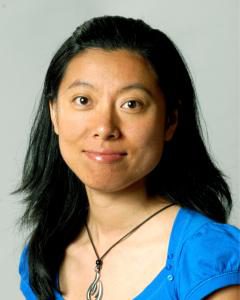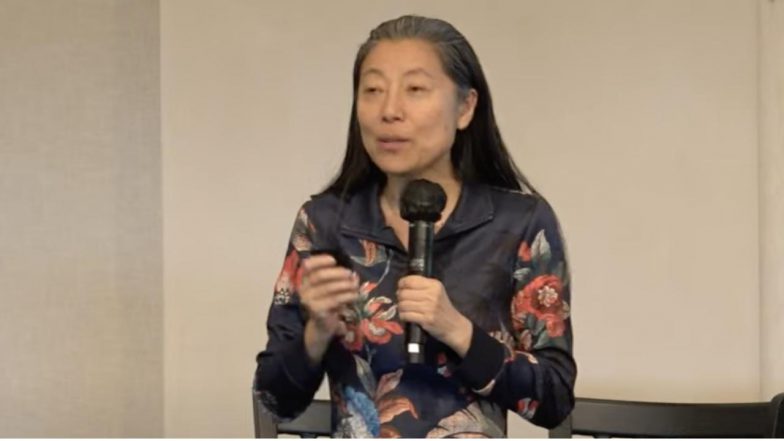Summary
Dawn Song is a Professor in the Department of Electrical Engineering and Computer Science at UC Berkeley. Her research interest lies in deep learning and security. She has studied diverse security and privacy issues in computer systems and networks, including areas ranging from software security, networking security, database security, distributed systems security, applied cryptography, to the intersection of machine learning and security.
She is the recipient of various awards including the MacArthur Fellowship, the Guggenheim Fellowship, the NSF CAREER Award, the Alfred P. Sloan Research Fellowship, the MIT Technology Review TR-35 Award, the George Tallman Ladd Research Award, the Okawa Foundation Research Award, the Li Ka Shing Foundation Women in Science Distinguished Lecture Series Award, the Faculty Research Award from IBM, Google and other major tech companies, and Best Paper Awards from top conferences. She obtained her Ph.D. degree from UC Berkeley. Prior to joining UC Berkeley as a faculty, she was an Assistant Professor at Carnegie Mellon University from 2002 to 2007.
Source: Berkeley website
Opaque Systems, Inc. – 25/02/2025 (16:03)
Professor Dawn Song, Professor, University of California, Berkeley, Oasis Labs, interview with Aaron Fulkerson at the Confidential Computing Summit 2024.
Music
OnAir Post: Dawn Song
About
Source: Website

- Research Interests: Deep learning, security, and blockchain. Deep learning and program synthesis and analysis. Secure deep learning and artificial intelligence. Blockchain and decentralized systems. Computer security, privacy, and applied cryptography, including security and privacy issues in systems, software, networking, and databases. Using program analysis, algorithms design, and machine learning for security and privacy.
I am the Facutly co-Director of
UC Berkeley Center on Responsible Decentralized Intelligence (RDI)
I am also part of the
Berkeley Artificial Intelligence Research (BAIR) Lab
Berkeley Center for Human-Compatible AI
- Current Research Projects in Deep Learning and Security
- List of Recent and Past Research Projects
Education
2002, Ph.D., Computer Science, UC Berkeley
1999, M.S., Computer Science, Carnegie Mellon University
Awards, Memberships and Fellowships
- ACM SIGSAC Test of Time Award, 2022
- IEEE Symposium on Security and Privacy Test of Time Award, 2020
- ACM SIGSAC Outstanding Innovation Award, 2020
- ACM SIGPLAN Distinguished Paper Award (OOPSLA), 2019
- Association for Computing Machinery (ACM) Fellow, 2019
- Institute of Electrical & Electronics Engineers (IEEE) Fellow, 2019
- Signatures Innovation Fellow, 2017
- Guggenheim Fellow, 2010
- MacArthur Fellow, 2010
- MIT Tech Review Top 35 Innovators Under 35 (TR35), 2009
- Okawa Research Grant, 2008
- Sloan Research Fellow, 2007
Source: Berkeley website
Web Links
Videos
Sociotechnical Approach to Safe AI Future
January 27, 2025 (06:00)
By: FAR․AI
Dawn Song from UC Berkeley shares “A Sociotechnical Approach to a Safe, Responsible AI Future,” advocating for science- and evidence-based AI policies that balance risk management with innovation. Her framework prioritizes deeper understanding of AI risks, transparency, and proactive harm monitoring. Key milestones include creating a taxonomy of risk vectors, conducting marginal risk analysis, mapping policy interventions, and drafting a flexible policy blueprint for varied societal needs.
Highlights:
🔹 Risk Understanding – Improve understanding of AI risks
🔹 Transparency – Increase transparency in AI development
Detection & Monitoring – Develop early detection and post-deployment monitoring for AI harms
Defense Mechanisms – Build effective defenses for identified risks
Trust Building – Foster trust and reduce fragmentation across the AI community
Publications
Selected
Source: Berkeley webpage
- J. Shen, C. Wang, L. Gong, and D. Song, “Joint Language Semantic and Structure Embedding for Knowledge Graph Completion,” in Proceedings of the 29th International Conference on Computational Linguistics, Gyeongju, Republic of Korea: International Committee on Computational Linguistics, 2022, pp. 1965–1978.
- X. Chen, L. Gong, A. Cheung, and D. Song, “PlotCoder: Hierarchical Decoding for Synthesizing Visualization Code in Programmatic Context,” in Proceedings of the 59th Annual Meeting of the Association for Computational Linguistics and the 11th International Joint Conference on Natural Language Processing (Volume 1: Long Papers), Online: Association for Computational Linguistics, 2021, pp. 2169–2181.
- D. Lee, D. Kohlbrenner, S. Shinde, K. Asanović, and D. Song, “Keystone: An Open Framework for Architecting Trusted Execution Environments,” in Proceedings of the Fifteenth European Conference on Computer Systems, EuroSys’20, 2020.
- C. Y. Cho, V. D’Silva, and D. Song, “Blitz: Compositional Bounded Model Checking for Real-world Programs,” in Proceedings of the 28th IEEE/ACM International Conference on Automated Software Engineering, 2013.
- D. Caselden, A. Bazhanyuk, M. Payer, L. Szekeres, S. McCamant, and D. Song, “Transformation-aware Exploit Generation using a HI-CFG,” EECS Department, University of California, Berkeley, Tech. Rep. UCB/EECS-2013-85, May 2013.
- T. H. Chan, E. Shi, and D. Song, “Private and Continual Release of Statistics.,” in Proceedings of the 37th international colloquium conference on Automata, languages and programming: Part II, ICALP’10, Berlin, Heidelberg: Springer-Verlag, 2010, pp. 405–417.
- H. Yin, P. Poosankam, S. Hanna, and D. Song, “HookScout: Proactive Binary-Centric Hook Detection.,” in Seventh Conference on Detection of Intrusions and Malware & Vulnerability Assessment.( DIMVA 2010), 2010.
- D. Akhawe, A. Barth, P. Lam, J. C. Mitchell, and D. Song, “Towards a Formal Foundation of Web Security,” in Proceedings of the Computer Security Foundations Symposium (CSF 2010), 2010.
- S. Hanna, R. Shin, D. Akhawe, A. Boehm, and D. Song, “The Emperor’s New API: On the (In)Secure Usage of New Client Side Primitives,” in W2SP 2010: WEB 2.0 SECURITY AND PRIVACY 2010, 2010.
- P. Saxena, D. Akhawe, S. Hanna, F. Mao, S. McCamant, and D. Song, “A symbolic execution framework for javascript,” in Proceedings of the IEEE Symposium on Security and Privacy, 2010.
- C. Y. Cho, C. Juan, G. Chris, V. Paxson, and D. Song, “Insights from the Inside: A View of Botnet Management from Infiltration,” in 3rd USENIX Workshop on Large-Scale Exploits and Emergent Threats (LEET), 2010.
- J. Caballero, N. Johnson, S. McCamant, and D. Song, “Binary code extraction and interface identification for security applications.,” in 17th Annual Network and Distributed Systems Symposium (NDSS 2010), 2010.
- P. Saxena, S. Hanna, P. Poosankam, and D. Song, “FLAX: Systematic discovery of client-side validation vulnerabilities in rich web applications,” in 17th Annual Network & Distributed System Security Symposium,(NDSS), 2010.
- J. Bethencourt, E. Shi, and D. Song, “Signatures of Reputation: Towards Trust Without Identity.,” in Financial Cryptography and Data Security ’10. Fourteenth International Conference, 2010.
- A. Barth, B. I. P. Rubinstein, M. Sundararajan, J. C. Mitchell, D. Song, and P. Bartlett, “A Learning-Based Approach to Reactive Security,” in Financial Cryptography and Data Security ’10. Fourteenth International Conference, 2010.
- S. Venkataraman, A. Blum, D. Song, S. Sen, and O. Spatscheck, “Tracking Dynamic Sources of Malicious Activity at Internet Scale,” in Advances in Neural Information Processing Systems (NIPS 2009), 2009.
- M. G. Kang, H. Yin, S. McCamant, and D. Song, “Emulating Emulation-Resistant Malware.,” in Proceedings of the 2nd Workshop on Virtual Machine Security, 2009.
- J. Caballero, Z. Liang, P. Poosankam, and D. Song, “Towards Generating High Coverage Vulnerability-Based Signatures with Protocol-Level Constraint-Guided Exploration.,” in Proceedings of the 12th International Symposium on Recent Advances in Intrusion Detection, September 2009, 2009.
- A. Barth, J. Weinberger, and D. Song, “Cross-Origin JavaScript Capability Leaks: Detection, Exploitation, and Defense.,” in Proceedings of USENIX Security Symposium, August 2009., 2009.
- P. Saxena, P. Poosankam, S. McCamant, and D. Song, “Loop-Extended Symbolic Execution on Binary Programs.,” in Proceedings of the ACM/SIGSOFT International Symposium on Software Testing and Analysis (ISSTA), July 2009., 2009.
Research
Areas
Source: Berkeley webpage
- Artificial Intelligence (AI)
- Operating Systems & Networking (OSNT)
- Security (SEC)
- Programming Systems (PS)
Centers
- Berkeley Artificial Intelligence Research Lab (BAIR)
- Berkeley Center for Responsible, Decentralized Intelligence (RDI) (RDI)
- Berkeley Deep Drive (BDD)
- Berkeley Institute for Data Science (BIDS)
- Center for Human Compatible Artificial Intelligence (CHAI)
- EPIC Data lab (EPIC)
- Foundations Of Resilient CybEr-physical Systems (FORCES)
More Information
Wikipedia
Contents
Dawn Song is a Chinese American academic and is a professor at the University of California, Berkeley,[1] in the Electrical Engineering and Computer Science Department.[2]
She received a MacArthur Foundation Fellowship in 2010.[3]
Education
Song earned her B.S. (1996) from Tsinghua University, her M.S. (1999) from Carnegie Mellon University, and her Ph.D. (2002) from the University of California, Berkeley.[3]
Career
Song became an assistant professor at Carnegie Mellon University (2002–2007) before joining the faculty at the University of California, Berkeley in 2007.
Song’s work addresses the computer security. Previously she worked on web security[4] and systems security, for example working on the DARPA Cyber Grand Challenge, where her team placed among the top seven finalists.[5] Her most recent work is understanding adversarial machine learning,[6] and blockchains.
Song is the Founder of Oasis Labs.[7] At UC Berkeley, Song is the co-Director of the campus-wide center: Berkeley Center for Responsible Decentralized Intelligence (RDI).[8]
Recognition
Song is the recipient of numerous awards, including a Sloan Fellowship, an NSF CAREER Award, the IBM Faculty Award, a Guggenheim fellowship,[9] and a MacArthur Foundation Fellowship.[10] In 2009, the MIT Technology Review TR35 named Song as one of the top 35 innovators in The World under the age of 35.[11]
She was elected as an ACM Fellow in 2019 “for contributions to security and privacy”.[12]
References
- ^ “Dawn Xiaodong Song’s Home Page”. Retrieved 2011-05-24.
- ^ “Dawn Song | EECS at UC Berkeley”. eecs.berkeley.edu. 2011-05-13. Retrieved 2011-05-24.
- ^ a b “Dawn Song”. John D. and Catherine T. MacArthur Foundation. Retrieved 2011-05-24.
- ^ “Dawn Song’s genius approach to web security – Mar. 18, 2011”. money.cnn.com. Retrieved 2024-03-08.
- ^ “DARPA | Cyber Grand Challenge”. 2016-08-01. Archived from the original on 2016-08-01. Retrieved 2024-03-08.
- ^ “How malevolent machine learning could derail AI”. MIT Technology Review. Retrieved 2024-03-08.
- ^ Barber, Gregory. “Oasis Labs’ Dawn Song on a Safer Way to Protect Your Data”. Wired. ISSN 1059-1028. Retrieved 2024-03-08.
- ^ “Center for Responsible, Decentralized Intelligence at Berkeley”. rdi.berkeley.edu. Retrieved 2024-12-24.
- ^ “Dawn Song – John Simon Guggenheim Memorial Foundation”. Archived from the original on 2012-09-23. Retrieved 2011-08-03.
- ^ “UC Berkeley Press Release”. Berkeley.edu. 2010-09-28. Retrieved 2011-05-24.
- ^ “2009 Young Innovators Under 35”. Technology Review. 2009. Retrieved August 15, 2011.
- ^ 2019 ACM Fellows Recognized for Far-Reaching Accomplishments that Define the Digital Age, Association for Computing Machinery, retrieved 2019-12-11
External links
- “Dawn Song”, DBLP Archived 2012-09-28 at the Wayback Machine



